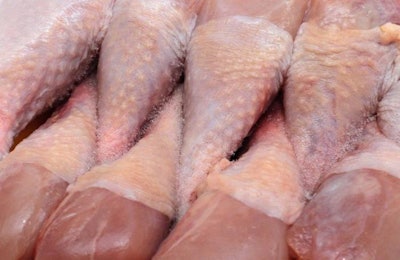
Producers of poultry meat and eggs in the European Union (EU) are calling for imports to be halted to prevent an oversupply of these products, and a subsequent market collapse.
To prevent an “oversupply crisis.” the associations of European farmers and farming agri-cooperatives, Copa and Cogeca called for a halt to imports of poultry meat into the community.
As they explained to the European Commission's Directorate-General for Agriculture and Rural Development (DG AGRI), the novel coronavirus (COVID-19) pandemic resulted in the abrupt closure of the food service sector across the EU.
While increased retail sales of some products have compensated for the lost sales to food service to some extent, this has not occurred for some high-quality niche products. Markets for duck, pigeon, quail, rabbit, guinea fowl, and goose have been heavily impacted, according to the associations.
Even for broiler and turkey meat, increased retail sales have not fully compensated for the loss of the food service channel. For the egg sector, the loss of this market outlet has hit the processed product sector.
On the other hand, some shortages of fresh eggs were reported at retail outlets.
Inputs in short supply
Coronavirus-related transportation restrictions interrupted the movement of hatching eggs and day-old chicks. Previously, these were often carried in passenger planes, which have been cut dramatically. As the routes became heavily restricted, prices for cargo transport have risen.
As a result of these difficulties, Copa and Cogeca also requested from DG AGRI support for the maintenance of parent and grandparent poultry breeding stocks.
Some poultry producers have also reported shortages of specialty feed ingredients, such as organic soy.
Storage facilities reach capacity
Since the start of the coronavirus epidemic in Europe, poultry meat imports from third countries have continued, according to Copa and Cogeca. Generally destined for the food service sector, these superfluous supplies of poultry meat have been placed in storage, but freezing capacity is now reaching its limit.
“This situation will cause an oversupply crisis from the moment restaurants, hotels and catering are open again, as consumers will not go to eat out of home twice as much as they did before the crisis,” said Charles Bourns, Copa and Cogeca Poultry Meat and Eggs Working Party chairman. “This will put tremendous pressure on price.”
Copa and Cogeca have not published any response from DG AGRI to their call to halt poultry meat imports, or on measures to support the poultry breeding sector.
European Commission forecasts COVID-19-related impacts on poultry sector
In its latest report on the short-term outlook for the agri-food sector, the European Commission forecasts a slight fall in poultry meat imports from third countries in 2020. It bases this forecast on the fact that the products imported from third countries—generally breast meat and processed products—are destined for the food service sector, which has been widely shut down over recent months.
At a recent press conference, a European Commission source explained that the poultry and pig meat sectors do not receive direct payments from the EU budget. This situation is unlikely to change. Instead, these industries benefit indirectly through support offered for the production of high-quality crops for animal feeds. Cultivation of grains and oilseeds are covered by the Common Agricultural Policy (CAP), and may receive support through direct payment schemes.
View our continuing coverage of the coronavirus/COVID-19 pandemic.
















